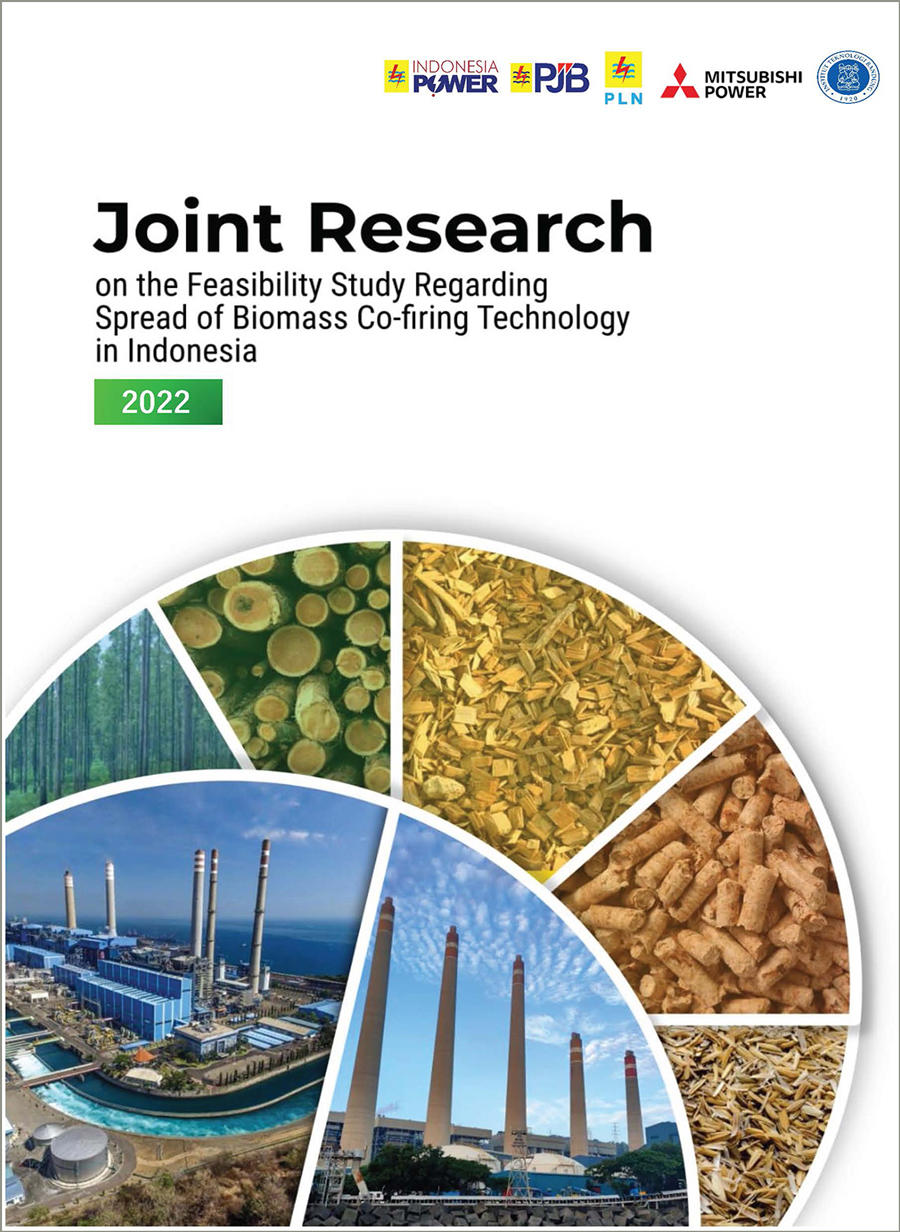Press Information
Mitsubishi Power Presents Proposal on Biomass Co-firing Adoption in Indonesia
-- Joint Initiative with Indonesia’s PLN Group and Institut Teknologi Bandung --
-- Joint Initiative with Indonesia’s PLN Group and Institut Teknologi Bandung --
・ Proposal incorporates results from studies conducted since an industry-academia MOU was concluded in September 2020
・ Selected co-firing fuel components are wood pellets and a potential biomass fuel, which are abundantly available and stably procurable at low cost in Indonesia
・ Existing thermal power facilities at Paiton Unit 1 and Suralaya Unit 2 earmarked for pilot study of co-firing with high biomass ratio

Cover of the proposal report
Tokyo, March 30, 2022 - Mitsubishi Power, a power solutions brand of Mitsubishi Heavy Industries, Ltd. (MHI), has presented a policy proposal to the Government of Indonesia to promote the adoption of biomass co-firing at the country’s thermal power plants. The proposal is a result of deliberations conducted since a memorandum of understanding (MOU) was concluded by an industry-academia collaborative team in September 2020. The team includes Mitsubishi Power, Indonesia’s state-owned electricity provider PT. PLN (Persero), two of its subsidiaries (PT. Indonesia Power and PT. Pembangkitan Jawa-Bali), and Institut Teknologi Bandung (ITB).(Note)
The Indonesian Government is currently implementing an energy policy that aims to raise the proportion of renewable energy in the nation’s energy mix to 23% by 2025, as part of its goal to reach carbon neutrality by 2060. In support of this policy, the presented proposal states that promoting biomass co-firing in Indonesia, where thermal power accounts for a high percentage of the country’s power generation mix, is an optimal short-term option for realizing the nation’s goals. The proposal elaborates on the initiatives needed and the challenges that need to be addressed in promoting the adoption of biomass co-firing.
In formulating the proposal, the five signatories of the MOU collaborated in selecting the appropriate biomass fuel components, determining the scope of requisite facility renovation and conducting economic evaluations. The proposal integrates PLN Group’s expertise in operating numerous thermal power plants in Indonesia and Mitsubishi Power’s biomass co-firing technologies, and reflects local policy analysis and biomass fuel market research conducted in Indonesia under ITB’s leadership.
Kazuki Ishikura, President of PT. Mitsubishi Power Indonesia said: “Indonesia’s clean energy goals will require a systematic exploration of various energy sources. Biomass is a low-carbon and renewable fuel source. As a valued renewable resource in Indonesia, it can potentially power the country’s energy transition in the near term.” Commenting on the policy proposal, he added that: “Mitsubishi Power is honored to be collaborating with PLN Group and ITB on this policy proposal as we explore innovative decarbonization solutions that can support Indonesia in realizing a more sustainable and secure energy future.”
The fuel components of wood pellets and a potential biomass fuel, which are abundantly available and stably procurable at low cost in Indonesia, were proposed in this plan. In addition to stable procurement potential, the fuel components were also proposed based on suitability for use in existing facilities and economic considerations. A supply chain study was also undertaken.
As candidates for facility renovations, two existing plants were considered: Paiton Power Plant Unit 1 in eastern Java, and Suralaya Power Plant Unit 2 in western Java. The policy proposal to promote the use of biomass co-firing in Indonesia was presented after studies were conducted on both facilities.
Based on the presented proposal, Mitsubishi Power will conduct grindability and combustibility testing at MHI’s Research & Innovation Center (Nagasaki) on a biomass fuel deemed promising in terms of latent volume and composition. Mitsubishi Power will continue to support the adoption of biomass co-firing while ensuring the sustainable use of Indonesia’s abundant forest resources and excess agricultural residues. Going forward, Mitsubishi Power will continue working closely with the governments of Indonesia and Japan, PLN Group and ITB to support Indonesia in achieving its decarbonization goals.- When the MOU was concluded, Mitsubishi Heavy Industries (MHI) was represented by Mitsubishi Power, Ltd. Accordingly, Mitsubishi Power is also participating in submission of the policy proposal. For details concerning the MOU signed in October 2020, see:
https://power.mhi.com/news/20201015.html
About MHI Group
Mitsubishi Heavy Industries (MHI) Group is one of the world’s leading industrial groups, spanning energy, smart infrastructure, industrial machinery, aerospace and defense. MHI Group combines cutting-edge technology with deep experience to deliver innovative, integrated solutions that help to realize a carbon neutral world, improve the quality of life and ensure a safer world. For more information, please visit www.mhi.com or follow our insights and stories on spectra.mhi.com.






